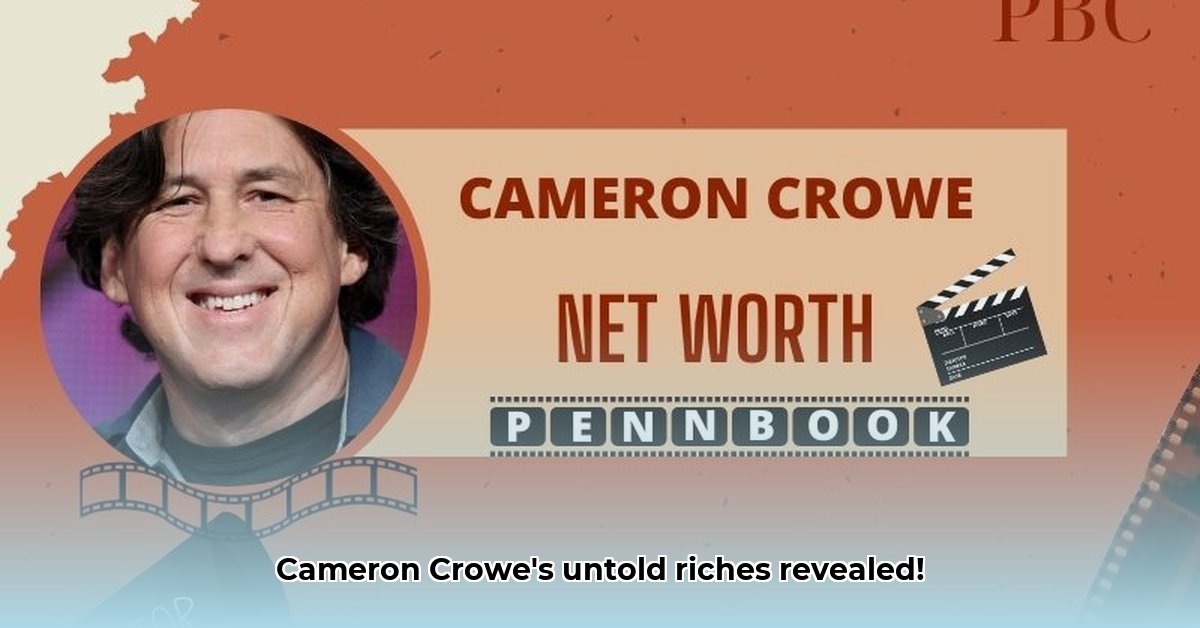
Cameron Crowe's story isn't just about a substantial net worth; it's a captivating narrative of passion, risk, and ultimately, triumph. From his immersive reporting days at Rolling Stone to directing iconic films like Almost Famous, Crowe's journey is as compelling as the stories he tells. This isn't a dry recitation of figures, but an exploration of how a young journalist transitioned into a Hollywood powerhouse, building a significant fortune along the way.
From Rolling Stone's Ranks to Ridgemont High's Reality: Building a Foundation
Long before the accolades, Cameron Crowe walked the halls of Rolling Stone, not as a detached observer, but as an active participant. His wasn't the typical journalist approach; Crowe immersed himself in the lives of the musicians he profiled, gaining a profound understanding of their experiences. This immersive journalism, detailed in articles like his iconic profile of the Allman Brothers Band, became the foundation for his unique cinematic voice. 1 This wasn't just about gathering quotes; it was about absorbing the essence of human experience. How did this immersion shape his future? It provided a unique perspective that would define his directorial style. Did this intensive approach pay off? Absolutely. It crafted the narrative foundation that underpinned his later success.
Hollywood's Sweet Symphony: Successes and Their Financial Echoes
Crowe's transition to filmmaking wasn't a mere shift in career; it was a natural evolution of his storytelling instincts. Fast Times at Ridgemont High, his directorial debut, wasn't your average teen movie; it was raw, real, and resonated deeply with audiences. This wasn't just a financial success; it was a validation of his unique approach. Subsequent films like Say Anything..., with its unforgettable boombox scene, further solidified his place in cinematic history. Jerry Maguire, his collaboration with Tom Cruise, became a box office behemoth, catapulting his financial standing. But it was Almost Famous, a semi-autobiographical story reflecting his Rolling Stone experiences, that cemented his status as a critically acclaimed and financially successful director. This wasn't simply box office receipts; it was a testament to his artistic vision. These weren't just films; they were financial milestones, individually and cumulatively.
The Ups, Downs, and Unexpected Twists of a Creative Career
Not every project reached the same heights. Vanilla Sky, Elizabethtown, and Aloha, while generating revenue, received mixed reviews. This doesn't diminish his accomplishments. Even the most successful careers experience ebbs and flows. However, the considerable success of his earlier works likely cushioned the financial impact of less profitable ventures, showing the importance of diversified creative risk management.
Beyond the Silver Screen: Diversifying for Continued Success
Crowe’s ambition extends beyond feature films. He’s ventured into documentaries and podcasts, creating new revenue streams and demonstrating his adaptability. This diversification wasn't merely a business strategy; it was a continuation of his creative exploration. These ventures have added additional layers to his portfolio and, consequently, to his overall net worth. It’s clear that Cameron Crowe continues to evolve. What is the financial impact of this continued creative output? A substantial contribution to his sustained wealth.
Estimating Cameron Crowe's Net Worth: A Challenging Calculation
Pinpointing a precise figure is challenging due to the private nature of financial information. However, considering his decades-long career encompassing writing, directing, producing, documentaries, and podcasts, his net worth is estimated to be in the tens of millions of dollars. This is a testament to his sustained success and multifaceted career. What does the future hold for his net worth? Given his ongoing creative endeavors, it's likely to continue growing.
How Did Cameron Crowe's Journalistic Background Shape His Filmmaking Style?
Crowe’s journalistic foundation profoundly shaped his filmmaking. His immersive style, honed at Rolling Stone, translated directly to his films, resulting in authentic dialogue, relatable characters, and narratives exploring universal themes of identity, belonging, and the search for authenticity. This isn't just creative influence; it's a core component of his success.